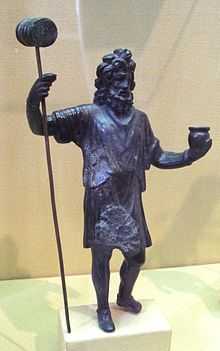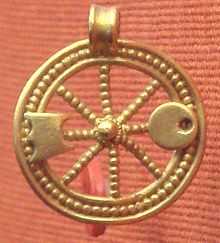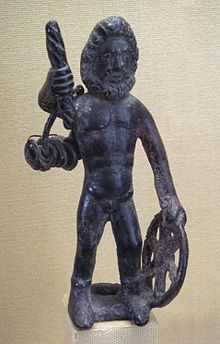Sucellus
| Look up Sucellus in Wiktionary, the free dictionary. |


In ancient Celtic religion, Sucellus or Sucellos was a god depicted in Gallo-Roman art as carrying a hammer or mallet and also a bowl or barrel. He has been associated with agriculture or wine production.
Sculptures

He is usually portrayed as a middle-aged bearded man, with a long-handled hammer, or perhaps a beer barrel suspended from a pole. His wife, Nantosuelta, is sometimes depicted alongside him. When together, they are accompanied by symbols associated with prosperity and domesticity.

In this relief from Sarrebourg, near Metz, Nantosuelta, wearing a long gown, is standing to the left. In her left hand she holds a small house-shaped object with two circular holes and a peaked roof – perhaps a dovecote – on a long pole. Her right hand holds a patera which she is tipping onto a cylindrical altar.
To the right Sucellus stands, bearded, in a tunic with a cloak over his right shoulder. He holds his mallet in his right hand and an olla in his left. Above the figures is a dedicatory inscription and below them in very low relief is a bird, of a raven. This sculpture was dated by Reinach (1922, pp. 217–232), from the form of the letters, to the end of the first century or start of the second century.
Inscriptions
At least eleven inscriptions to Sucellus are known (Jufer & Luginbühl p. 63), mostly from Gaul. One (RIB II, 3/2422.21) is from York in England.
In an inscription from Augst (in antiquity, Augusta Rauricorum) Sucellus is assimilated to Silvanus (AE 1926, 00040):
- In honor(em) /
- d(omus) d(ivinae) deo Su/
- cello Silv(ano) /
- Spart(us) l(ocus) d(atus) d(ecreto) d(ecurionum)
The assimilation of Sucellus to Silvanus can also be seen in artwork from Narbonensis. (Duval 78)
Etymology
In Gaulish, -cellos is interpreted as 'striker'. It is derived from Proto-Indo-European *-kel-do-s whence also come Latin per-cellere ('striker'), Greek klao ('to break') and Lithuanian kálti ('to hammer, to forge').[1] The prefix su- means 'good' or 'well' and is found in many Gaulish personal names.[2] Sucellus is therefore widely glossed as 'the good striker.'
References
- Delamarre, X. (2003). Dictionnaire de la Langue Gauloise (2nd ed.). Paris: Editions Errance. ISBN 2-87772-237-6
- Deyts, S., Ed. (1998) A la rencontre des Dieux gaulois, un défi à César. Paris, Réunion des Musées Nationaux. ISBN 2-7118-3851-X
- Paul-Marie Duval. (1957–1993) Les dieux de la Gaule. Paris: Presses Universitaires de France / Éditions Payot.
- Jufer, N. and T. Luginbühl (2001) Répertoire des dieux gaulois. Paris, Editions Errance. ISBN 2-87772-200-7
- Reinach, S. (1922) Cultes, mythes et religions

